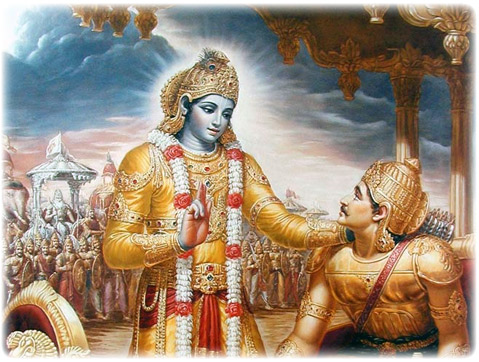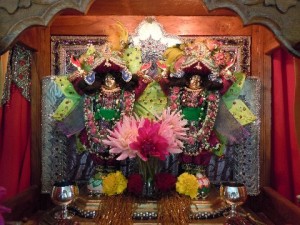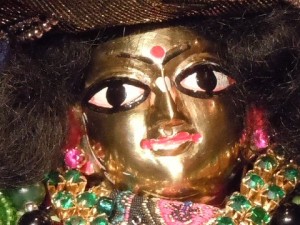Hare Krsna Prabhus
Obeisances
All glories to Srila Prabhupada
740401mw.bom Conversations 358851/530501
Prabhupada: Karma-yogi means one who does everything for Krsna. He’s
karma-yogi.
Guest (1): One who does everything for…?
Prabhupada: For Krsna.
Guest (1): For Krsna.
Prabhupada: Just like you are doing, doing some work. For whom you are
doing?
Guest (1): For my own benefit.
Prabhupada: That’s all. So that is karma. But when you do the same
thing for Krsna, that is karma-yoga.
Guest (1): But (Hindi), if you do it for others, for Krsna, for
Krsna’s…
Prabhupada: Others… Others means… That is also a humbug. You
cannot do anything for others. You do everything for yourself. That is
a false propaganda. You see? That is humbugism. So either you can do
for yourself or for Krsna. That’s all.
Guest (1): I see. (Gujarati)
Prabhupada: (break) …become a slogan nowadays. Nobody does for
others. “For others,” “For the poor,” these are all humbug.
Guest (1): You think people are doing something hospitals, that is for
others?
Prabhupada: Yes. That is also punya-karma.
Guest (1): (Hindi) Helping these temples, hospitals…?
Prabhupada: Yes. Temple construction is different from hospital
construction. That is for Krsna.
Guest (1): But suppose somebody’s doing hospitals. Is it not for
others?
Prabhupada: Yes. But how many you can give shelter? A few. There are
so many suffering people. You cannot provide hospitals for all of
them. The hospitals are increasing, and the disease also increasing.
Guest (1): No, as you say that doing for others is humbug.
Prabhupada: No, no. Humbug means he cannot do it.
Guest (1): Accha.
Prabhupada: He cannot do it. He can do to his satisfaction only. That
is… That is also for his satisfaction.
Guest (1): I see.
Prabhupada: Because by opening hospital, you cannot stop disease. That
is not possible. Then what you are doing for the others? That is for
your satisfaction. Try to understand. Because you cannot do anything,
but still, you are wasting your time. That is for your satisfaction.
Guest (1): Naturally for myself.
Prabhupada: Yes. Hare Krsna. You cannot do anything. The hospitals are
increasing, beds are increasing, and the diseases are increasing. Then
what can you do?
Guest (1): We can do our own satisfaction.
Prabhupada: That’s all. (break) …done not meant for Krsna, that is
for his own satisfaction. Just like Arjuna wanted to become
nonviolent: “No, no, Krsna. I cannot kill my kinsmen.” That is a good
proposal. But that was his satisfaction.
Guest (1): That is very correct.
Prabhupada: Yes. That was his satisfaction. But Krsna wanted that “You
must fight.” And when he agreed to that, that is his perfection.
Before that, he was trying to satisfy he.
Guest (1): Yes. When he surrendered to Krsna, that was his…
Prabhupada: Yes, that is the only purpose of life. Anything that is
done, that is useless waste of time. Therefore Krsna particularly
said, sarva-dharman parityajya mam ekam saranam vra… That is ekam.
You try to satisfy Krsna only. That will give you perfection.
Otherwise your own satisfaction, that’s all.
Guest (1): Yes, very correct, very correct.
Prabhupada: Whatever you do, that is your satisfaction. That is karma.
Guest (1): But not yogi.
Prabhupada: No, karma. (break) …for your own sense satisfaction,
that is karma. And if you do it for Krsna’s satisfaction, that is
karma-yoga.
Makhanlal: Pure bhakti and karma-yoga considered to be exactly the
same?
Prabhupada: Exactly the same.
Prabhupada: Pure bhakti is above karma-yoga. Pure bhakti is above
karma-yoga.
Bhagavata: That is the difference between the Chapter Karma-yoga and
Karma-yoga in Krsna Consciousness.
Prabhupada: Yes. Pure, pure devotion means Sravanam kirtanam.
Guest (1): I read fifteen percent power cut from today in the state.
They have not able to do the service in electric. (break)
Prabhupada: …cut, cent percent. (break)
Makhanlal: …you’re performing, is the vaidhi-bhakti stage of…
Prabhupada: Yes.
Makhanlal: …of the sadhana-bhakti, the regulative principles.
Prabhupada: Yes, vaidhi-bhakti means regulative principles, and when
you are accustomed, automatically you perform, that is raga-bhakti.
Makhanlal: So vaidhi-bhakti is considered superior to karma-yoga then.
Prabhupada: No. Karma-yoga is better.
Makhanlal: Karma-yoga is better?
Prabhupada: Yes.
Indian man: Pure bhakti is superior.
Prabhupada: Pure bhakti is sravanam kirtanam. Sravanam kirtanam
visnu-smaranam pada-sevanam, that is pure bhakti. (break)
Yasomatinandana: …formed by anybody.
Prabhupada: Eh?
Yasomatinandana: Karma-yoga.
Prabhupada: Unless one is inclined to take to devotion, it is not
possible to take to karma-yoga. Who can sacrifice the profit?
Yasomatinandana: Does karma-yoga mean to follow exactly the sastras?
Prabhupada: Karma-yoga means yat karosi yaj juhosi kurusva tat
mad-arpanam.
Yasomatinandana: Doing only for Krsna.
Prabhupada: Yes. That is karma-yoga.
Devotee: Which means?
Prabhupada: “Whatever you do, the result give Me.”
Devotee: To Krsna.
Prabhupada: Yes.
Yasomatinandana: So we are also, those who are on the vaidhi-bhakti
(indistinct) on karma-yoga path because we are…
Prabhupada: Yes. They are acting under the order of the spiritual
master. That is bhakti-yoga.
Bhagavata: So when one follows the nine activities of devotion purely,
that is pure bhakti.
Prabhupada: Yes.
Bhagavata: Then when he’s following those nine activities, then he’s
superior.
Prabhupada: Eh?
Bhagavata: Then that’s superior to karma-yoga, to follow those nine
principles purely.
Prabhupada: Yes.
Makhanlal: Raganuga-bhakti is also superior to karma-yoga then?
Prabhupada: Bhakti is perfect stage. That is not for ordinary man.
Yasomatinandana: What is the difference between karma-yoga and… or
bhakti because they also (indistinct) Krsna?
Prabhupada: Now go on doing your duty, you’ll understand (indistinct).
Don’t try to understand in one day.
Bhagavata: It will be revealed to us as we act.
Prabhupada: Yes, the more you become in service attitude, things will
be revealed to you. (Sanskrit) prakasante. Becomes, it becomes
manifest. Sevonmukhe hi jihvadau sam eva sphuraty adhah. (break)
Short quotes on WORK from BG
Bg 6.17 P Sankhya-yoga
As far as work is concerned, a Krsna conscious person does not do
anything which is not connected with Krsna’s interest, and thus his
work is always regulated and is untainted by sense gratification.
Bg 11.55 P
As far as work is concerned, one should transfer his energy
entirely to Krsna conscious activities. No work should be done by any
man except in relationship to Krsna. This is called krsna-karma.[where does making model planes for Krsnas
interest, fit in here?]
One may be engaged in various activities, but one should not be attached
to the result of his work, but the result should be done for Him.
Bg 3.9 Work done as a sacrifice for Visnu has to be performed, otherwise
work binds one to this material world. Therefore, O son of Kunti,
perform your prescribed duties for His satisfaction, and in that way
you will always remain unattached and free from bondage.
….. Varnasramacaravata purusena parah puman. visnur
aradhyate (Visnu Purana 3.8.8). Therefore one has to work for the
satisfaction of Visnu. Any other work done in this material world will
be a cause of bondage, for both good and evil work have their
reactions, and any reaction binds the performer. Therefore, one has to
work in Krsna consciousness to satisfy Krsna (or Visnu); and while
performing such activities one is in a liberated stage. This is the
great art of doing work, and in the beginning this process requires
very expert guidance. ..This practice will not only save one from the reaction of work,
but will also gradually elevate one to transcendental loving service
of the Lord, which alone can raise one to the kingdom of God.
Bg 3.15 P Karma-yoga
The Vedas are therefore codes of working directions. Anything performed
without the direction of the Vedas is called vikarma, or unauthorized
or sinful work. Therefore, one should always take direction from the
Vedas to be saved from the reaction of work.
Bg 4.20 This freedom from the bondage of actions is possible only in Krsna
consciousness when one is doing everything for Krsna. ..He does his duty to his
best ability and leaves everything to Krsna. Such an unattached person
is always free from the resultant reactions of good and bad; it is as
though he were not doing anything. This is the sign of akarma, or
actions without fruitive reactions. Any other action, therefore,
devoid of Krsna consciousness, is binding upon the worker, and that is
the real aspect of vikarma, as explained hereinbefore.
SB 1.2.6 We have purposely denoted dharma as occupation because the root
meaning of the word dharma is “that which sustains one’s existence.” A
living being’s sustenance of existence is to coordinate his activities
with his eternal relation with the Supreme Lord Krsna,as Krsna is the
central pivot of living beings,…
NOD …Sanat-kumara says, “My dear King, the false ego of a human being is so strong that it keeps him in material existence as if tied up by a strong rope. Only the devotees
can cut off the knot of this strong rope very easily, by engaging
themselves in Krsna consciousness… This tight knot of false ego is due to ignorance. As long as one is ignorant about his identity, he is sure to act wrongly and thereby
become entangled in material contamination..
Bg 4.17 P If one is serious about liberation from material bondage, one has
to understand the distinctions between action, inaction and
unauthorized actions. The entire Bhagavad-gita is directed toward
this conclusion. Any other conclusions, against this consciousness and
its attendant reactions, are vikarmas, or prohibited actions.
SB 3.29.8 P Explanation of Devotional Service by Lord Kapila
In the conditioned stage, when one engages in devotional service, he should follow the instruction of the bona fide spiritual master in full surrender. The spiritual master is the manifested representation of the Supreme Lord because he
receives and presents the instructions of the Lord, as they are, by
disciplic succession. It is described in Bhagavad-gita that the
teachings therein should be received by disciplic succession,
otherwise there is adulteration. To act under the direction of a bona
fide spiritual master with a motive to satisfy the Supreme Personality
of Godhead is pure devotional service. But if one has a motive for
personal sense gratification, his devotional service is manifested
differently. Such a man may be violent, proud, envious and angry, and
his interests are separate from the Lord’s
[Benefits” for acting
without fruitive activities].
Bg 18.13-14 Purport – The ultimate will is invested in the Supersoul, as it is stated in
the Gita, sarvasya caham hrdi sannivistah. He is engaging everyone in
certain activities. Acts done under His direction from within yield no
reaction, either in this life or in the life after death.
Bg 4.20 T -Abandoning all attachment to the results of his activities, ever
satisfied and independent, he performs no fruitive action, although
engaged in all kinds of undertakings.
Purport-This freedom from the bondage of actions is possible only in Krsna
consciousness when one is doing everything for Krsna. A Krsna
conscious person acts out of pure love for the Supreme Personality of
Godhead, and therefore he has no attraction for the results of the
action. He is not even attached to his personal maintenance, for
everything is left to Krsna. Nor is he anxious to secure things, nor
to protect things already in his possession. He does his duty to his
best ability and leaves everything to Krsna. Such an unattached person
is always free from the resultant reactions of good and bad; it is as
though he were not doing anything. This is the sign of akarma, or
actions without fruitive reactions. Any other action, therefore,
devoid of Krsna consciousness, is binding upon the worker, and that is
the real aspect of vikarma, as explained herein before.



